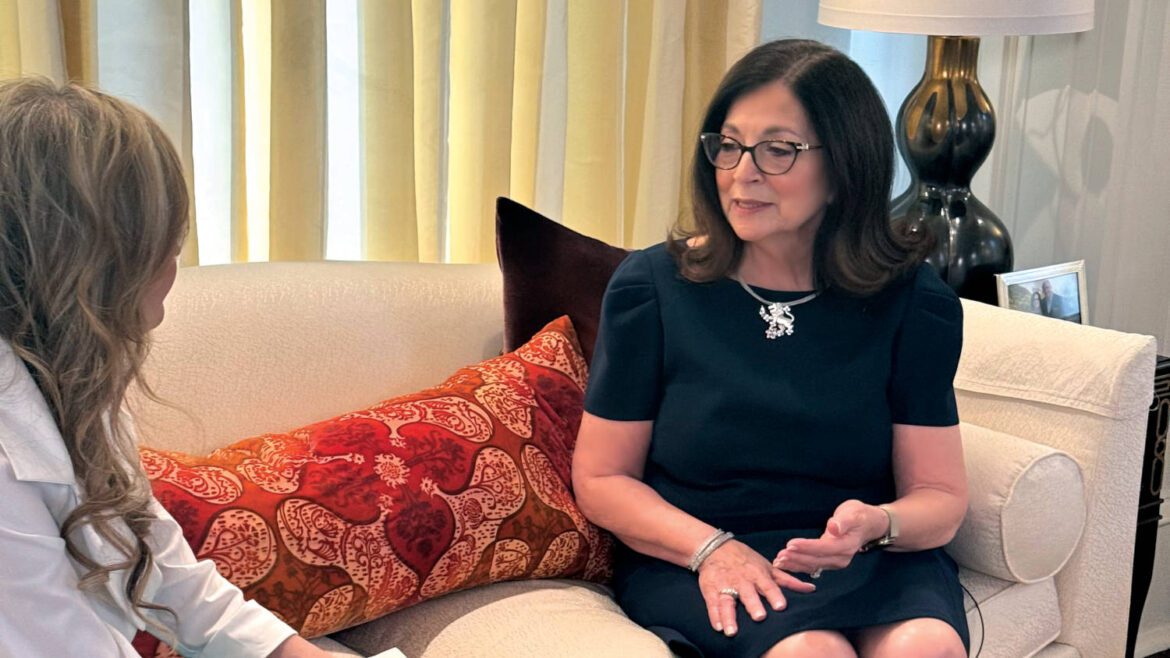She is the daughter of Ukrainian Jews, a child born in the aftermath of humanity’s darkest hour, the Holocaust, under storm clouds that, even now, seven decades on, have yet to dissipate. When, as a young girl, she came to know her heritage, it became clear that the courage, resilience, and strength to supersede suffering and overcome loss was the blood of her forebears that coursed through her veins. Throughout her life, she would draw upon these innate strengths, through trial and tribulation, persevering and succeeding in work, life, and love. ANITA ZUCKER comes from a long line of survivors. Her story evolves from the concentration camps and ghettos her family endured, to her own life, which otherwise might have been meaningless had she not embraced her birthright and evolved into the woman she was meant to be. By dedicating her life and wealth to helping those far less fortunate than she but no less worthy, Anita Zucker honors those who came before her—and leaves a brilliant legacy all her own.
Your maiden name, Goldberg, is historic and prominent in Western Europe. Can you share your family’s history?
My father and my mother’s families worked in retail and manufacturing. My father’s family was primarily in retail and my father was in sales. His parents were Chava Elka and Yehuda Leib Goldberg. My mother’s family were milliners. They owned a factory that made hats for both civilians as well as the Polish military. My mom, who was a young teenager at the time, loved skipping school and working with her father in the plant where she learned how to sew the emblems for the Polish soldiers onto their hats. During those formative years, her father taught her everything from how to purchase products to the fundamentals of manufacturing. She would take their horse and wagon from their home (which today would be in Ukraine) and go to Warsaw, Poland. In Yiddish, the name of the town where they lived was Ludmir. Both my mom and my dad were raised there.
How old were you when you realized that your parents had survived the Holocaust in WW II?
I was about eight years old when I began to understand what really happened to my family, where they lived, and how they came to America. I went to Sunday school, where they showed us a video about the Nazis and what happened during World War II to the Jewish people. I was a little girl, so when I came home and talked about it, Mom started sharing her experiences. From that day forward, she never hesitated to tell us the stories about her life and her family. While my mother’s siblings Peretz and Reuven, who were very young and survived the war, her only sister, Rachel was murdered along with her brothers, Moshe, Bentzi, and Herschel.
My dad, though, was not willing to tell us as much about what he experienced and endured. His hardships began early on when he lost his mother through childbirth. His father remarried and in 1933 his stepmother sent his sister Sarah away to what was then called Palestine. This is the reason she was the only other member of my father’s family to survive. He lost his entire family, who lived in what is now Ukraine. His three brothers Yankel, Mottel, and Shaiah, his father and stepmother, were all murdered.
It was difficult to overcome. Before marrying my mother, he was married to a lovely lady, and they had one daughter. In 1939, when their daughter was three, the first bombings occurred, and one bomb demolished their building. My dad was not home but when he returned, the building was turned to rubble. He searched through the debris until he found the bodies of his wife and his baby.
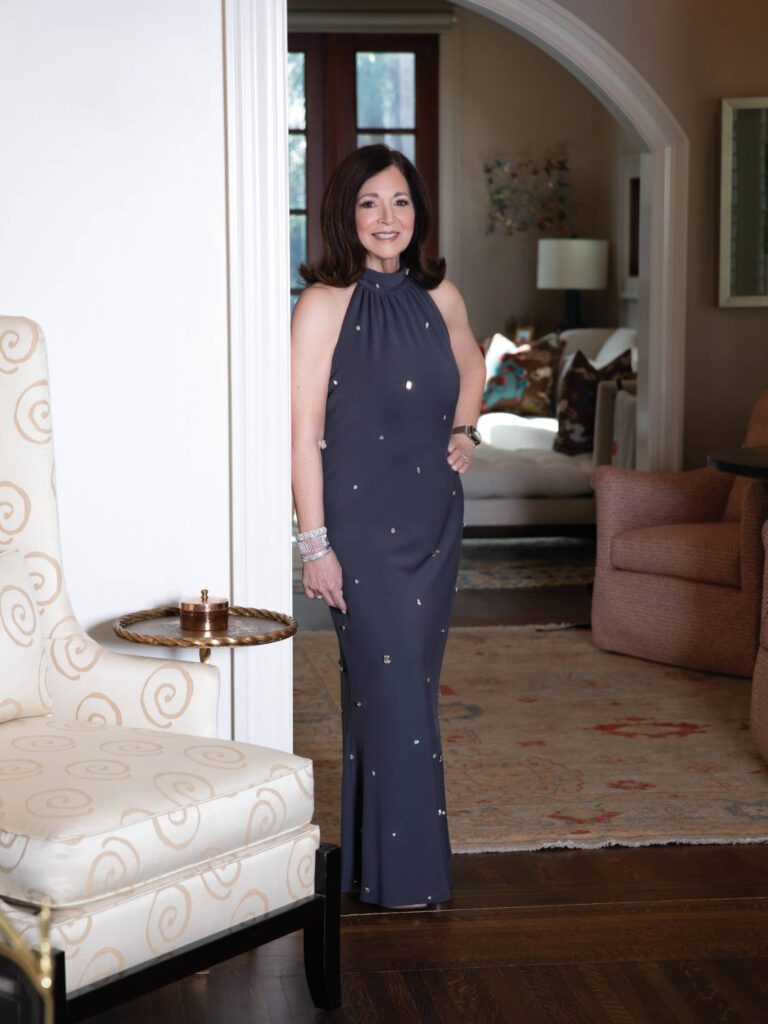
Photograph by Michael Paniccia
When did your father tell you about what happened?
My father never talked about it until I was much older. My mother had a photograph of my father’s wife and baby. It was such a surprise when we realized that he had a family before ours. It took us 20 years before we knew the baby’s name but when we turned the picture over, on the back of the photograph we saw that her name was Nechama, which is meaningful because it means “soul.” It is hard to think that I could have had another sister, but she was murdered.
You mentioned that your father’s family; parents, brothers, and stepmother all perished. Do you know what happened to them?
They were forced to live in the ghetto during the war and were murdered . . . probably during one of the pogroms where the Jewish people were randomly rounded up, and sent to either concentration camps or shot in one of many mass graves.
I don’t know exactly how my father survived, he never fully explained how he managed to avoid death. There is a historical book about their ghetto. My dad is mentioned as being a partisan. He often spent time in the woods, during the war, trying to help by gathering food, finding information on what was going on, working with other partisans, and getting provisions back to the ghetto. After his entire family was murdered, he lived in the same building as my mom’s family, which is how they came to really know each other.
Had they met before then?
Yes, they were neighbors and my mom had known his daughter and played with her when she was a little baby. The last years that my mother lived in the ghetto she was a teenager, and 18 years old.
How did she survive?
During that period of time, tragically, many people were shot, killed, and thrown into mass graves. My mother was forced to enter a work crew. One of the things my mother had to do was to cover the mass graves. On one occasion, she found her brother’s clothing, and she knew he was murdered. She recognized the patches on the pants because she had sewn them on, mending them where she could. Members of her family went to say prayers and the Nazis bolted the doors of the synagogue, poured gasoline, and burned the synagogue down. Her father and another of her brothers were burned alive.
I can’t imagine the horror your mother felt. Did she tell you about losing her father and brother?
I have a video of my mother telling the story of them being burned alive. At the time one of her brothers was living underground. She called it a “living grave.” At some point, he just couldn’t take it anymore, he missed his family. Her brother was a little bit older than she was and all seven children were very close. She said, “Had he stayed just one extra day underground, he would not have died in the fire, but he just couldn’t take it anymore.” He wanted to be with his family and was murdered in the fire with his father.
During the time my mother was part of a work crew, the Nazis would come and get her. She was beaten, tortured, and blinded in one eye. I never knew she was blind until she moved here in the last several years of her life. I heard her doctor say to her, “You are blind in one eye, aren’t you?” And she responded, “Yes, I was beaten by the Germans.” Though she lost her vision, somehow, she managed to get a driver’s license and managed to drive until she was in her nineties. She was amazing in that way; she was strong and the things she went through taught her to be tough.
Did any members of your mother’s family survive the ghetto roundups?
Yes. My mom and her younger brothers, who were only eight and 10, survived the final roundup, they were the few who were lucky. They were placed in the last group slated to be rounded up, in the ghetto.
The Nazis broke into their little, tiny room that housed 16 family members. How they didn’t find my mother was a miracle. Amidst the chaos she hid underneath a straw mattress where she stayed as quietly as she could so they wouldn’t find her.
Out of the corner of her eyes, she watched the Nazis take her entire family away, her mother, her young brothers, another brother, and his wife.
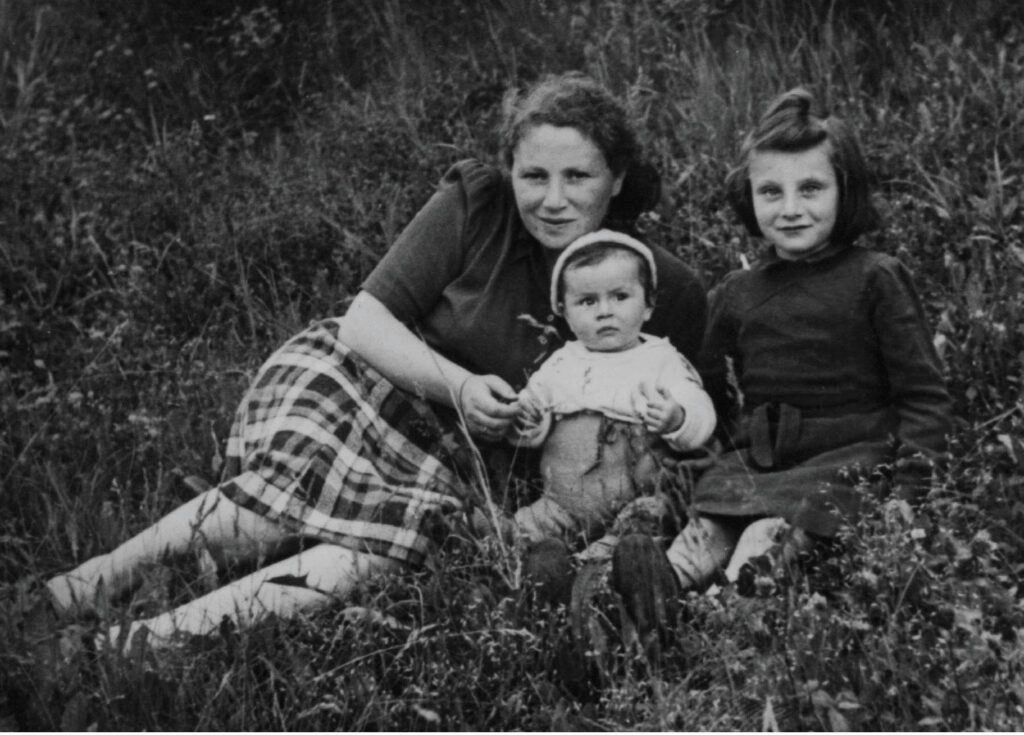
Rose Goldberg , Anita’s mother, along with her sister, Eva Goldberg (right), and her cousin, Esther (center) pictured in a field in Eshvega which is near Kassel, in Germany, circa 1947.
Did any of her family members, that were taken by the Nazis in that room survive, other than your mother?
Yes. Her mother taught her to be tough and her father taught her to be prepared, even though he didn’t survive.
When the coast was clear, and the Nazis had taken her entire family, she crawled out from under the mattress and checked the room where she found an infant. The baby was her niece, her brother and sister-in-law’s 16-month-old child. She picked up the baby and decided that wherever she was going, that baby would go with her.
They loaded the rest of the family into wagons, one of which was carrying my grandmother and my two uncles, who were young and smart. My grandfather had taught all seven siblings where there were hiding places. Somehow, they got my grandmother off the transport. They remembered one of the hiding places, a little cobbler’s shop nearby, and the three escaped by covering my grandmother and themselves with wood. At that time a lot of the shoes were made of wood. By hiding under the wood, they were not found.
Of your entire family, who else survived the Holocaust?
In my mother’s family, my mother, her two little brothers, my grandmother, and this baby that she carried, her niece, survived. And my father survived. He was the only survivor of his family, other than his sister.
How many perished?
Oh my goodness, my mom lost four siblings and her father, and I couldn’t tell you the number of aunts, uncles, and cousins. I don’t know. I know that there were 25,000 Jewish people in that ghetto when the war began, at the end of the war, 200 survived.
And then of your father’s family?
Only my father, everyone was murdered, which is tragic.
How did he hold onto life and keep hope?
I’m not sure how he did it, but he did. I will tell you; my family were all very faithful people. My dad loved to go and pray in the synagogue, and he loved his community. They just believed that God was good and somehow their faith would carry them through. They remained faithful until the day my mom died, which was just about four years ago.
How old was she when she died?
She was 96.
Can you imagine the changes that that woman saw during her life?
I am sad that she is gone, but I am glad that she is not seeing the conflicts in the world today.
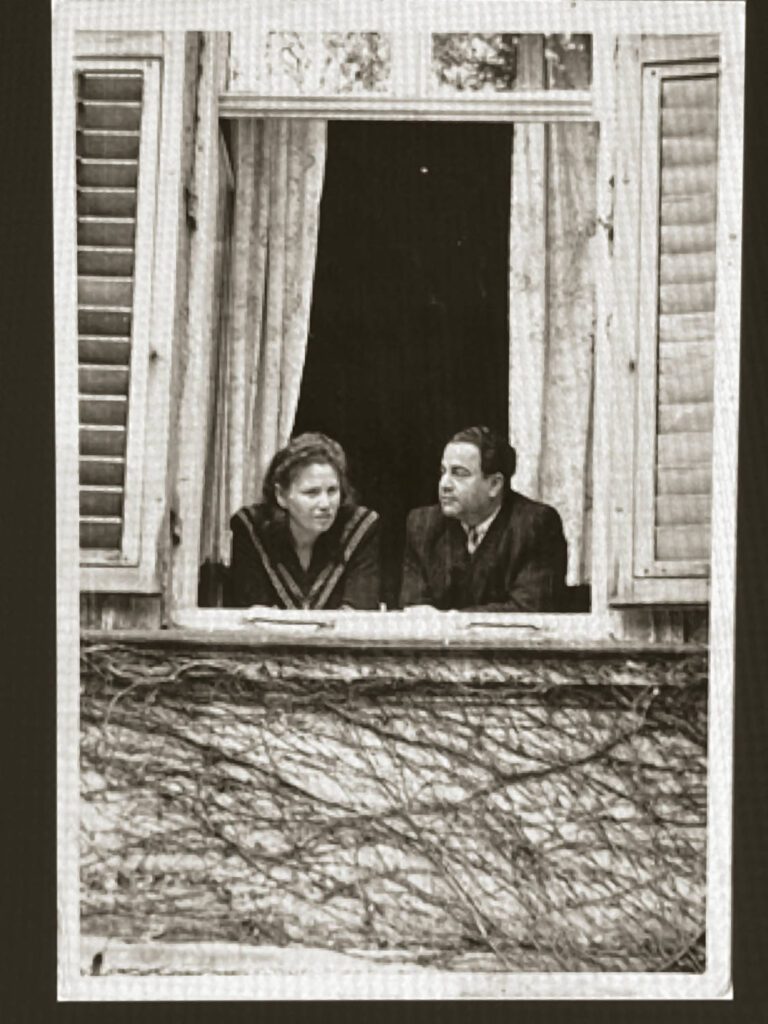
Anita’s parents, Rose and Carl Goldberg, in the window of the Displaced Person’s Camp, Schlachtenzsee in Germany about 1946.
During the Holocaust, how did your family, as a unit, stay together?
They had no income, no home . . . nothing of material value, so they were forced to move around. My mom, her mother, the infant niece, and her two baby brothers traveled together.
My dad learned later that my mom was still alive and joined them. There was a spark between them from before when they met in the ghetto. At that time, my mother’s father was not happy, because my mother was so much younger than my dad. But so much had happened since the ghetto . . .
What was the age difference?
11 years difference. My dad was born in 1912 and my mother was born in 1923.
He obviously gravitated to some semblance of life that he understood.
Yes. While they were in the ghetto, he lived in the same house but in a different room.
I did not ask, but on that fateful day when the Nazis were making the final “round up” of the Jewish people, how did your father survive?
A wall fell on him that day, and it saved him from being captured. Later he escaped and joined the partisans in the woods, where he stayed until he learned that my mother survived. So somehow, he made it back to her. The most interesting thing is that when you look at where the hiding places were located, every hiding place was within two hours of the town they grew up in.
Geographically they were never far in distance. My dad would be in the woods, and of course, my mother would move the family from place to place. She had a baby with her, the infant niece.
During the moves there was one betrayal my mom told us about. They were looking for refuge and she saw her own uncle tell a man who they were seeking shelter from not to let them stay. Her uncle told the man that because she had a baby, their lives were all placed at risk (including her uncle) of being captured.
Did her uncle live?
He lived, but we never met him. To my knowledge, he was the only person outside of the group I mentioned, that survived. She never wanted us to find him, and we didn’t.
He betrayed her in the worst way, and the baby wasn’t even her child. Did they stay in the hiding place, after all?
Yes, she convinced the owner of the property where the hiding place was, to let her and the baby stay for one night. She said, “I will move the baby as soon as I can. Please let us in. It’s 32 below zero and I can’t, I can’t go on.”
He was kind and he let them stay, where they sheltered for at least one night. Somehow this teenage woman managed to take a baby and find the next hiding place. She went back each night and brought each family member, one person at a time, for several nights. It was incredibly cold, frozen, and snowing outside. I don’t know how she did it.
Is survival hardwired in you?
It is. My mom gave us skills, but others came naturally, partly from genetics. We also learned from her stories about what she went through and how she protected her family. She was a true believer in faith, friends, and immediate family . . . because she saw what her uncle had done.
Did they ever return to the town they originally came from?
Yes, they returned and found their property, but everything was gone. They married in the house where my mother lived but nothing was left there, it was just a shell. They had several ceremonies but the first one was in what originally, was my mother’s home. It was attended by Russian soldiers and the few family members that had survived.
The Russians had taken over their town and my mom said roughly 500 Russian soldiers came to one of their wedding ceremonies.
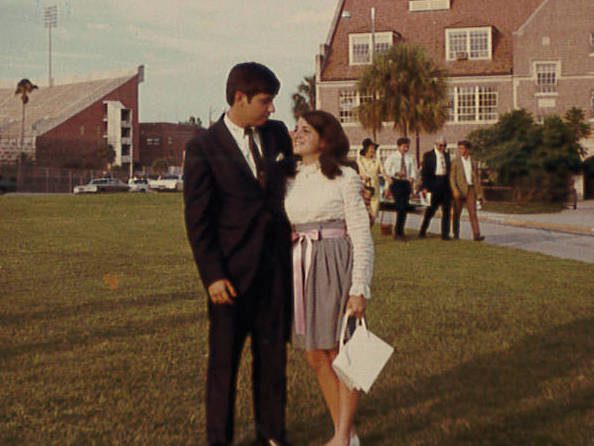
Jerry Zucker and Anita Goldberg at her sister, Eva Goldberg’s college graduation from the University of Florida, May, 1968.
Why did they decide to leave?
They had to make a decision. They looked at each other, she, and my dad, and they said, “We can’t live like this.” They could not live under the communist rule. It was a tough time. The area was a part of Poland at that point. Today it is in Ukraine, but it is very close to the Polish border.
And Poland was under the Soviet Union’s control. How did they leave?
They made a deal with the owner of a truck and gave him what little that they had with them, some of which was sewn into their clothing. One little outfit might have had buttons, coins, or something they were able to use, as a trade. My dad spoke seven languages and my mom spoke four, so they managed that way.
The truck was double walled so my mother’s whole family and my dad hid in between the walls. One of the stops along the way was in Lodz, Poland, where they lived for about six months.
I was not told about Lodz until later in my life, but I located the apartment building. When I called my mom, she confirmed that was where they lived. My uncle who was still alive at that time, gave me an address to a street that doesn’t exist today.
We went to a museum in Lodz and gave them the street address that my uncle had provided. They gave us the corresponding address, the place, street, and number. Sure enough, we found the building.
The museum was a converted train station, from which they deported all the Jews. Even today, the museum still has the deportation train cars. They created a museum where you can retrieve historical information. You just cannot imagine the amount of data that the Germans kept.
There are books sitting on tables inside the rooms of the train station with the names of every Jew that came out of that ghetto, where they were deported, and to which camp, they were sent. We saw all of that.
Poland was not liberated at that time. How did they escape?
Sometime between 1945 and 1946, they were placed in what was called a DP camp. And it was in a “displaced person’s” camp my older sister was born. It was a rough delivery.
Your grandmother was almost catatonic from the trauma. How did she adapt after the birth of your older sister?
She was getting better, but my God, she suffered so much tragedy. You can’t replace the losses she suffered. But she had Esther to take care of, her two sons, and now, she had my mom and the new baby. She always got along with my dad, thank goodness. They were all together in this DP camp for a while.
Life got better there. They secured employment, began to earn money, and focused on what their next steps would be. My grandmother, her two sons (mom’s two brothers), and Esther decided to go first. In 1948, they left the DP camp and went to Israel. My mom and dad didn’t have enough money to go to Israel with them.
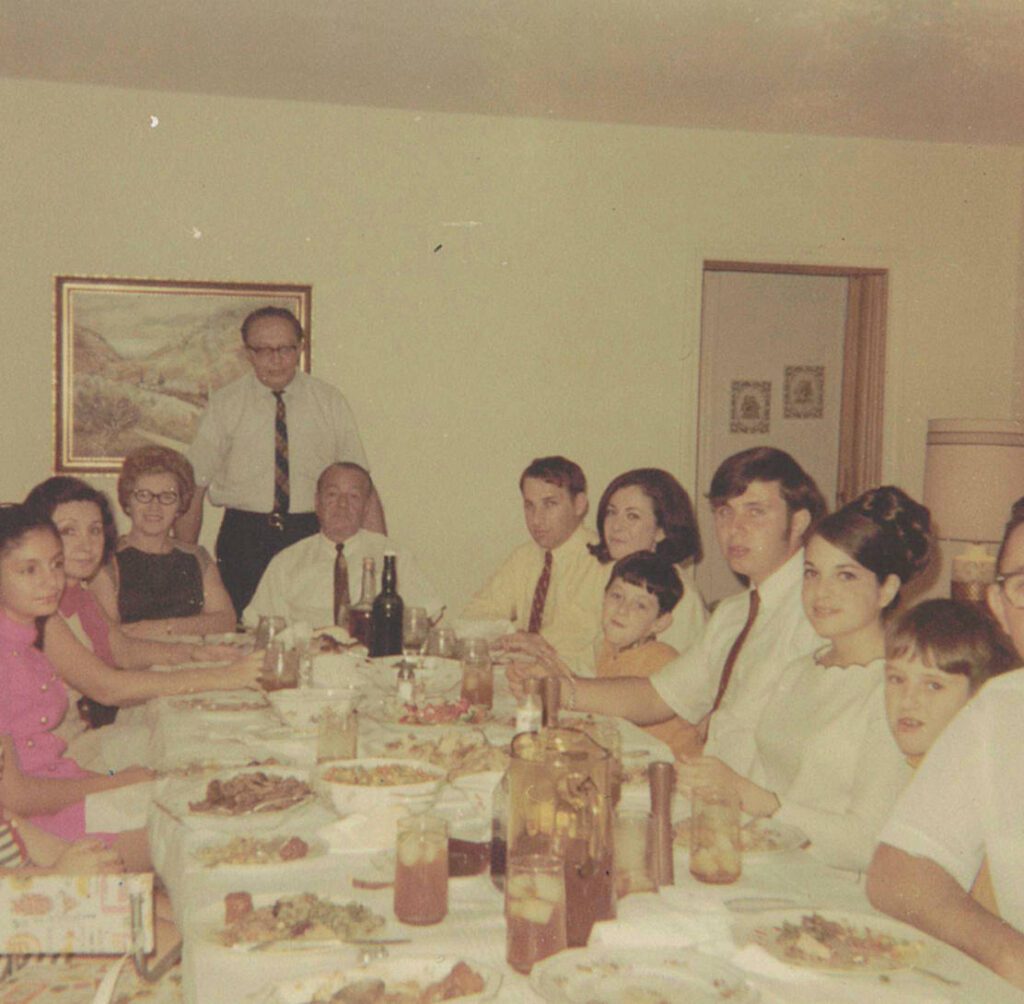
Passover Seder at the Goldberg’s home, April, 1969. Leon Zucker is standing, to the right side of the table you have Charles Lipman, Eva Goldberg, Ben Mibab, Jerry Zucker, Anita Goldberg and Charles Mibab. Her parents, Rose and Carl Goldberg are sitting at the head of the table. To the left side of the table you have Zipora Zucker and Rochelle Zucker.
Why did your mother, father, and sister choose to live in America?
After saving money and getting cleared through official channels, they were sent to one of the ports in Germany, and an organization named HIAS, Hebrew Immigrant Aid Society, which still exists today helped them immigrate.
My parents and three-year-old sister boarded the General Ballou and were processed into Ellis Island where they were then routed to Jacksonville, Florida. They had $200 in their pockets.
What did they do for a living in Jacksonville, Florida?
My mom worked for a Jewish family who helped them get an apartment within walking distance to a synagogue. They placed my sister in kindergarten. My parents learned to drive and speak English. But well before that, my mom was working. She was hired to count inventory because she didn’t need to speak English for that. She learned to count inventory as a child in her family’s business. She knew numbers and would work at night when my sister was sleeping.
When my mom became pregnant with me, little by little her work switched to daytime hours. She iced cakes in a grocery store, and she still worked for the Jewish family, in a retail store.
My dad was hired by another Jewish family who had a grocery store. He worked in the produce department with vegetables and fruits. He also loved to make signs. When he could speak and write English, he made signs and he loved drawing caricatures, which is probably why my little sister became an artist, which is cute too. She was born while he was still working in the grocery store.
Eventually, he decided not to work for anybody, he wanted to be self-employed. So, with three daughters by then, Susie and I are five years apart, he invested in property and had residual income from their apartments.
My dad finally made the big decision that he was going to have his own business. By then my uncle moved to Jacksonville from Israel and the two of them bought full-service gas stations. They were also good with numbers and expanded the business to selling tires and owning U-Haul franchises.
When was the first time you saw your husband, Jerry?
That’s a cute story. I was walking downtown with my girlfriends, and someone said, “That’s Jerry Zucker.” His mother was our teacher. At that time, both his parents taught me at the synagogue. I was twelve at that time.
Were you a good student?
Yes, I was a good student and well-behaved. His parents moved to Jacksonville when I was eight or nine years old. They helped start the day school at the Jacksonville Jewish Center in Jacksonville, Florida. My mother-in-law’s still alive. She’s 96 now.
What did Jerry’s father do?
Jerry’s father was a trained rabbi, but he also was a diamond cutter and they were in Israel. Jerry’s mother’s entire family left Poland in the 1930s and emigrated to what was Palestine. Jerry’s father’s family sent him away to study in Palestine, and their entire immediate family was murdered. Jerry’s father and mother became my religious school teachers.
Much like your father’s family, Jerry’s father’s family was killed.
Yes. Everybody, mother, father, and siblings are all gone.
Okay, Jerry Zucker’s mother and father taught you . . .
Yes, we were 12-year-old girls and at an age where we were just getting interested in young men. We didn’t know him well, but we knew who they were and that they went to our synagogue.
You were 12 and he was 14. When did you actually meet?
Not until I was 14 almost 15 and he was about 17. His dad was at my aunt and uncle’s home and said, “Go home and change your clothes and ask your parents if it’s okay for me to take you home with me. I want to introduce you to my son.” My mother-in-law was in bed because she had had some kind of surgery. I spent time with her and wished her a speedy recovery. She had taught me when I was 12.
The rabbi, your father-in-law was he trying to connect you two?
Yes. He was making a match.
Did he ever tell you that?
Yes. He wanted us to know each other. Absolutely. There were other girls that Jerry could have gone out with. Once they introduced us, we dated ever since.
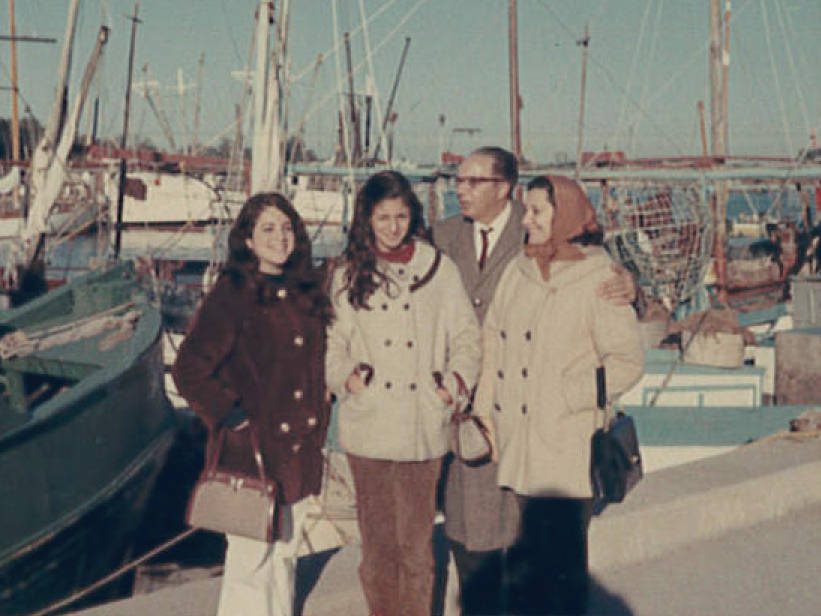
Anita Goldberg, Rochelle Zucker, Leon and Zipora Zucker in Tarpon Springs, Florida, in December, 1969.
Did you know from age 14 on that you would marry him?
Maybe not at 14, but maybe by 15. A little later.
How old were you when you were married?
I was 18 when I got married, in 1970. My parents took me to find an apartment and I attended a community college that had the perfect program for me. I got to be a teacher’s aide and for four years I worked 20 hours a week in the schools, in a public school.
Is that what precipitated your love for education?
That was a piece of it. My parents knew we needed education because they didn’t get to complete theirs.
For 10 years you taught school and during that time, you and Jerry started building your own family. At what point did you start really learning about his business? Because you became the CEO of the Hudson Bay Company, which was at that time unheard of.
When our second child was born, we decided I needed to take a leave from education. One day I just said, “Jerry, guess what? I need a job. I can’t stay home. I don’t want to go back to the classroom because I want to have freedom for the kids. I want to help you and the business.” I became involved in the Charleston Metro Chamber of Commerce. At some point, he decided I should learn product development, which was the beginning of an entirely different aspect of the business.
He was a serial entrepreneur and that mind of his never stopped, he was always inventing, creating, problem-solving.
From the time we got married, we had businesses.
What is Hudson Bay known primarily for?
The Hudson Bay Company is the oldest fur trading company and retail operation in North America. My tenure was very short. My husband decided to buy it, and we closed in 2006. There were almost 600 stores with five different footprints of kinds of stores.
When he was sick, he said, “I’m sorry. I can’t do all the things I really wanted to do, and I have to leave it up to you and I’m going to trust you to make whatever decision you need to make. If you, however you want to deal with it, I’m leaving it to you.” Unfortunately, he died not long after that. When he passed away, someone who had served on his board made an offer, and I took it, with a three-month close date.
In July of 2008, I closed the deal just before the stock market crashed.
I understand the fortitude that it takes to close a business deal of that magnitude with all the emotional highs and lows. How did you do it?
When Jerry got sick, we spent 21 months, every night he taught me things that I needed to know about the business. I wanted to know things like, how did he keep this team together? What are the keys to succeed? One day he handed me a piece of paper and said, “I wrote down these things.” And he said I want you to share them. We call it Mr. Z’s Keys to Success.
Do you know what they are?
I don’t know every one of them by heart. But the most important one to me was to “have a sense of urgency and a bias for action.” And to me, that is absolutely one of my guiding principles. Having that sense of urgency and the bias for action was critical because if I had waited around, nothing would have happened. The business might not have survived. He just left me with these things that said take care of our family. Promise me that you will do these things. And to him, a promise was sacred. I had to promise that I would take care of our family and that I would do everything in my power to keep this business together and going which meant reviewing, updating, and always finding new ways.
He was a seeker of knowledge and a serial entrepreneur.
He was absolutely both. My youngest child is a serial entrepreneur. But all the children were bitten by the entrepreneurial bug.
A survival skill, isn’t it?
It is. My mother was an entrepreneur too. I have to give her credit.
The only way to survive is to be thinking several steps ahead.
Another of my favorite Mr.Z’s key to success was if you love your job, you’ll never work a day in your life.
What is your largest accomplishment…the thing you are most proud of?
Easily, the one accomplishment I am most proud of is our three children.
Jonathan our oldest child is a graduate of Georgia Tech. He has an MBA. I made him CEO, 2 years ago this month and he is doing great, wonderful. What I love about him is that he moved home and came to work with us. It wasn’t anything he really planned to do. He worked out in the field after Georgia Tech for about 10 years before we said, will you please come home? We really want you to be near us and come into the business with us.
I still want to be a part of the business, attend meetings, and be a part of the leadership team but he makes the decisions.
And your daughter?
My daughter Andrea and my oldest are three and a half years apart. She went to University of Pennsylvania and graduated summa cum laude. She is a smart young lady and an outstanding communicator. She is focused on social impact and is busy creating alternatives to juvenile detention, trying to help change what’s happening right here in our region. And I’m very proud of her for working on that and in that field because it’s really difficult what’s happening to our young people. So often they get picked up for doing nothing and it changes their life. She lives in Maryland and is involved in a global organization called Nexus.
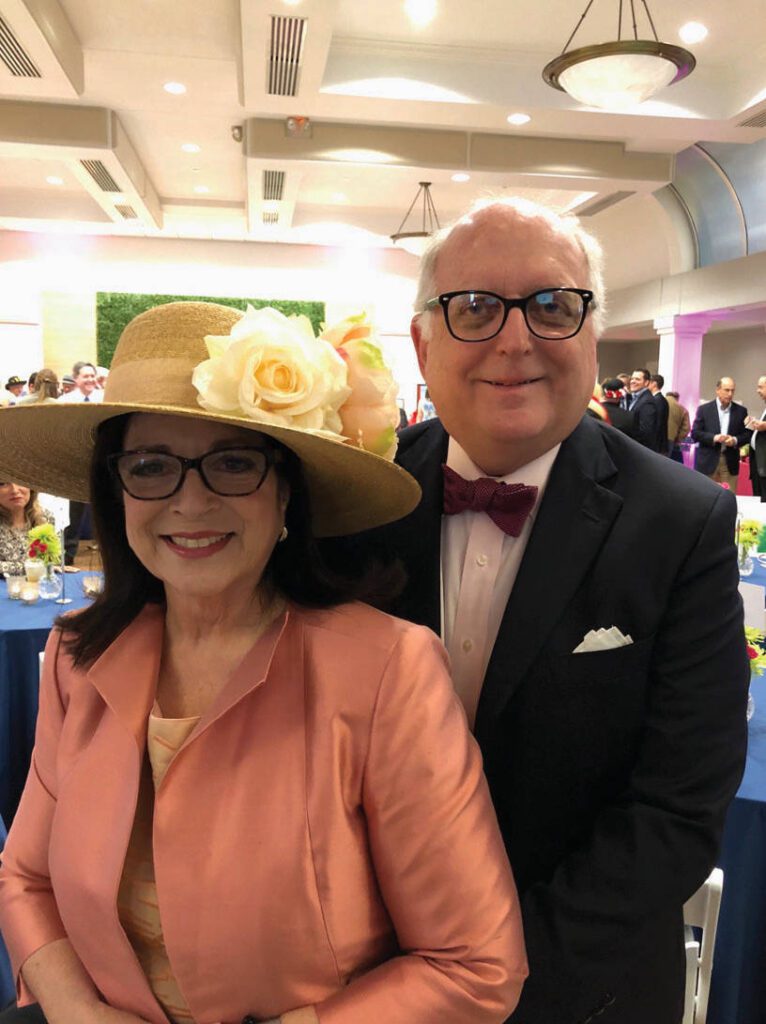
Anita Zucker and David Popowski, April, 2016, at a Kentucky Derby party.
And then your son, Jeffrey?
Jeffrey went to Boston University and is the real serial entrepreneur today. He never realized how much he was like his dad until now, you know? The loss of his dad was really hard on all of us, but especially hard on him as the baby because he had less years with his father. He wants to break into television and movies and just made his first full-length movie which is hilarious. It is about something that he is very passionate about: hockey. Its title is The Late Game and is about a beer league in hockey.
And where is it being streamed?
I don’t know yet but hopefully it will start this month on Amazon Prime, though he has not given me all the details. However, it was all filmed right here in Charleston, South Carolina at the Carolina Ice Palace. I love it and am so excited. One of our news channels picked it up and they did such a beautiful story about two hometown kids who were hockey players as youths together.
What is your focus, in the future, your legacy so to speak?
My family and I focus on the differences we can make in the lives of people by providing opportunity and access to education. Education is the one thing that you really can’t take away. Education also “scales”. We really try to make a difference in the lives of people at every stage of life. Fourteen years ago I created an organization called Cradle to Career, which is still going strong. Though I am not as active as I once was, I pay attention closely to the work that is being done.
Your philanthropic focus has included the Medical University of South Carolina. (MUSC). Is healthcare important as well?
My primary area of focus at MUSC became neurology and neurosurgery, because of my husband Jerry’s illness.
What happens in the brain is so critically important to growth. If we can keep the brain healthy then hopefully a person is able to learn. I worked with some of the leadership at MUSC on young children. We had worked with the Duke Endowment to see if we could get funding for infant telemedicine during the early months of the baby’s lives—say the first six months. A lot of parents do not have transportation and by using telemedicine medical people can see what’s happening with that child. It is important that we help those babies and the greatest learning time in a child’s life is the early stages. By the age of three, they are sponges, taking in everything.
MUSC has amazing neurologists and neurosurgeons. I have learned a tremendous amount about epilepsy, Parkinson’s, brain tumors, and brain cancer serving on the advisory board which convenes at least three times a year. And we bring in doctors to teach us and explain the latest and greatest in the field. I love being educated on new things and I think lifelong learning is critical.
You are also passionate about Trident Technical College. Did that come from your father?
Yes, and to learn about cars and with automobiles… how do I change oil? How do we fix this or that? Using your hands, being able to create and do and make. Oh my God, over 40 years ago, I became involved with Trident Technical College and was invited to serve on the foundation board where businesspeople come together monthly and have meetings to help the school. We are the ambassadors. I chaired their school’s first-ever capital campaign and have worked with Mary Thornley for 18 years. I became a member of what is called the Area Commission which is the Governing board.
Now you are at the tip of the spear for recruiting a successor for your friend, President Thornley.
Yes, I chair the governing board currently and also chair the search committee to find a successor for a president who cannot be replaced because she is incredible.
And finally, the University of Florida, a life spent legacy focus.
It is important to me because I have legacy giving there. One of the things we created was a center of excellence in Early Childhood Research and Education within the School of Education which focuses on the child from zero to five. I learned from the most incredible professors who travel the world to share their depth of knowledge about how to make infants reach their fullest potential and be the best that they can be and how to develop them through the years. If you look at their website, it has the A to Z’s of early childhood education.
Your fingerprints are literally plastered all over education.
A hundred percent. In Florida, I have also been involved in brain cancer research. We created the Remission Alliance for patients with brain cancers like glioblastoma, the cancer my husband Jerry had. It is a collaboration of 12 different colleges, universities, and institutions that have dedicated researchers and physicians who work on this field every day. Every day. And the one thing that I have seen is the effect on people’s quality of lives. It’s much improved and lengthened by the studies, by the work, by the clinical trials that our doctors are creating. And the things I’ve learned from that are just incredible. But what I’ve also worked at is creating collaboration.
Your children share your desire to change the world. Is that a part of your legacy as well?
Absolutely. What am I proudest of? My kids, who they are, and the fact that they are good people. I think it is so important . . . how they behave, hold themselves in the world, what they do for others, and how they take care of others to make their lives better. We all believe in that.
Tell me about David Popowski, who is your partner now…
There is a great story about how and why I know his family. My husband told me he wanted me to have a life and several years after Jerry passed away, boom, David came into my life.
We share a lot in common both background and history. His parents are also Holocaust survivors and are from Poland, the town is Kaluszyn. David’s mother and Jerry’s father knew each other as teenagers in that town. Jerry’s father biked to that city, where other cousins and relatives of his lived. He would visit the late Mrs. Paula Popowski, David’s mother, a wonderful lady. Coincidentally, Paula Popowski’s aunt married Jerry Zucker’s father’s uncle.
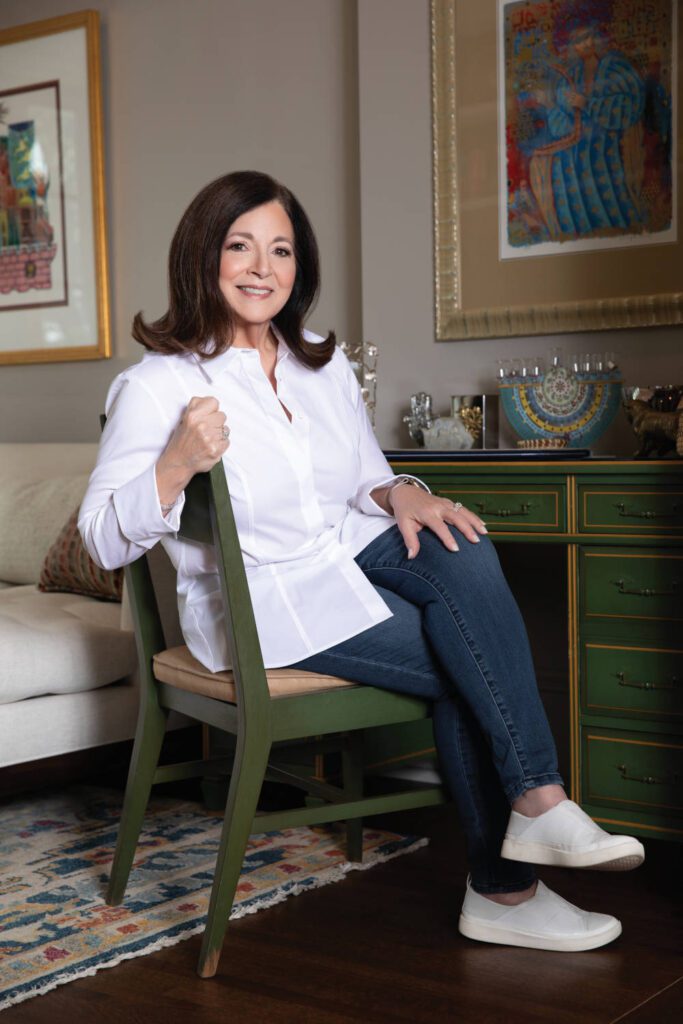
Anita Zucker at home; she sits by a desk that is very sentimental to her as it had belonged to her mother, Rose. Photograph by Michael Paniccia.
Oh, that’s so funny…a blood connection by marriage?
The other interesting piece of their history is that as the war progressed, his mother and sister became Catholic girls. They worked in a glass factory and lived in a monastery. There Is more to all of our stories. They survived, time passed, and they ended up in a DP camp, the same camp as my parents for a very short time.
Do you think that that historical backdrop is one of the things that draws you together?
A hundred percent because I am driven by who I am and David would probably say the same. We come from almost the exact kind of background by having two parents who also survived and went through so much. Jerry’s dad went through a lot, but Jerry was born in Israel.
The Zucker family relatives relocated to Charleston, South Carolina, which was a hub for immigrants coming here from Kaluszyn, Poland. When the war ended David’s mother and father were married there and had their first child Mark, David’s older brother. Eventually, they were placed on the ship headed to America because Jerry’s great aunt and uncle sponsored the Popowskis.
They lived in apartments until they built their own house and they owned a furniture store. David’s dad was a peddler and he would go out to the country with whatever they could get ahold of. It is an amazing story because so many of our Jewish families started out that way when they immigrated to America.
They were survivors.
They found a way to survive. I just love that we are connected. David was born here in Charleston; I think his mother was pregnant with him on the ship. His parents came a month after my parents, but my parents were sent to Jacksonville. His parents were sent here.
But the cutest thing is that David and Jerry knew each other. I have pictures of them together at the ages of two and three years old. Their families were very close friends. My sister met David’s sister before we ever met. Okay. The connectivity is like the Twilight Zone.
I want to talk about Israel and what is happening there now.
So it’s such a tragedy and I am sad. I don’t want any people being killed. We have to care and love each other. I believe in teaching that. I believe there is good in all humanity, and we need to find that good. It feels like deja vu at this moment.
I was taught to be vigilant and in turn, taught my children to be vigilant. My husband Jerry taught us to be vigilant, but he also taught us not to be a bystander to hate. The Jewish people that survived all over the world have done incredibly amazing things and yet they are being hated again and we are being terrorized.
I have concern for my grandchildren. What is the world going to be like for them? As Jewish people the state of Israel was always a place to go if God forbid there was a problem that came up in the world today. My mother always said, do anything and everything you can to protect Israel, it is the only place we have that’s ours. And I agree with her. It is hard to deal with because we are a small number of people in the world. I am not sure why people think we have so much power . . .
I want you to give one piece of advice to a woman, particularly a young woman coming up that was impactful to you and or could have changed your life. Had someone told you. What would that one piece of advice be?
One of the most important things I can tell a woman is to get every bit of education you can, absorb everything that you can, and keep learning. Women have so much to learn.
Dr. Mary Thornley taught me not to be fearful, to feel confident, and to step up and speak. I think every woman needs to have confidence in themselves, and you get confidence by being educated.
Never sit in a room and feel like you can’t say a word because you don’t have something to add…if you are informed you will add value. If you are sitting in a boardroom, make sure you are educated. Prepare yourself always, and as a woman, be prepared so that you are confident enough to speak up any time you need to.
With education and preparation, you can face the world with strength. Women bring the world so much and we have to continue.

